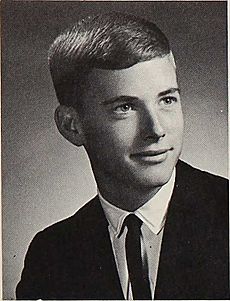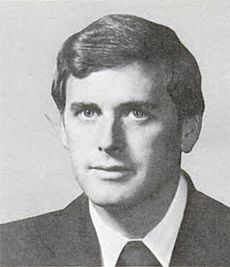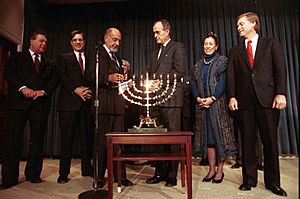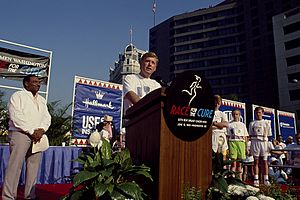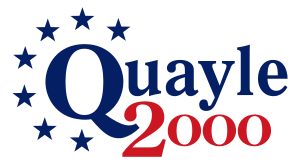Dan Quayle facts for kids
Quick facts for kids
Dan Quayle
|
|
|---|---|
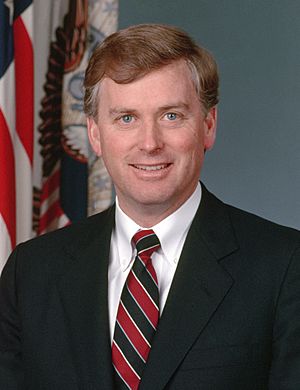
Official portrait, 1989
|
|
| 44th Vice President of the United States | |
| In office January 20, 1989 – January 20, 1993 |
|
| President | George H. W. Bush |
| Preceded by | George H. W. Bush |
| Succeeded by | Al Gore |
| United States Senator from Indiana |
|
| In office January 3, 1981 – January 3, 1989 |
|
| Preceded by | Birch Bayh |
| Succeeded by | Dan Coats |
| Member of the U.S. House of Representatives from Indiana's 4th district |
|
| In office January 3, 1977 – January 3, 1981 |
|
| Preceded by | Edward Roush |
| Succeeded by | Dan Coats |
| Personal details | |
| Born |
James Danforth Quayle
February 4, 1947 Indianapolis, Indiana, U.S. |
| Political party | Republican |
| Spouse | |
| Children | 3, including Ben |
| Parents | James C. Quayle Martha Pulliam |
| Relatives |
|
| Education | DePauw University (BA) Indiana University, Indianapolis (JD) |
| Signature |  |
| Military service | |
| Allegiance | United States |
| Branch/service | United States Army |
| Years of service | 1969–1975 |
| Rank | Sergeant |
| Unit | Indiana Army National Guard |
James Danforth Quayle (born February 4, 1947) is an American retired politician. He served as the 44th vice president of the United States. He was Vice President from 1989 to 1993 under President George H. W. Bush.
Quayle is a member of the Republican Party. He represented Indiana in the U.S. House of Representatives. He was a Representative from 1977 to 1981. He also served in the U.S. Senate from 1981 to 1989.
He was born in Indianapolis, Indiana. He spent much of his childhood in Paradise Valley, Arizona. He married Marilyn Tucker in 1972. He earned his law degree in 1974. He and Marilyn worked as lawyers before he was elected to Congress.
In 1988, George H. W. Bush chose Quayle as his running mate. They won the election. Quayle became Vice President in January 1989. During his time in office, he visited 47 countries. He also became the chairman of the National Space Council. He was nominated for Vice President again in 1992. However, the Bush–Quayle ticket lost to Bill Clinton and Al Gore.
After leaving office, Quayle wrote his memoir, Standing Firm. He later joined Cerberus Capital Management, a private-equity firm. He has remained active in the Republican Party.
Contents
Early Life and Education
Dan Quayle was born in Indianapolis, Indiana. His parents were Martha Corinne and James Cline Quayle. His family moved to Arizona in 1955. There, his father helped run a part of the family's newspaper business.
Quayle returned to Indiana for high school. He graduated from Huntington North High School in 1965. He then went to DePauw University. He earned his degree in political science in 1969. He was also on the university's golf team.
After college, Quayle joined the Indiana National Guard. He served from 1969 to 1975. He reached the rank of sergeant. While serving, he studied law at Indiana University Robert H. McKinney School of Law. He earned his law degree in 1974. At law school, he met his future wife, Marilyn.
Before becoming a politician, Quayle worked in various roles. He was an investigator for the Indiana Attorney General's office. He also worked as an assistant to Governor Edgar Whitcomb. After law school, he worked for his family's newspaper.
Time in Congress
In 1976, Quayle was elected to the House of Representatives. He represented Indiana's 4th congressional district. He won against a long-serving Democrat. He was reelected in 1978.
In 1980, Quayle made history in Indiana politics. At 33, he became the youngest person elected to the Senate from Indiana. He defeated a three-term incumbent. He was reelected to the Senate in 1986. He won with a very large margin of votes.
Vice Presidency (1989–1993)
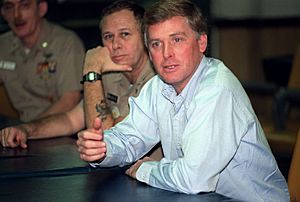
During his time as Vice President, Quayle traveled to 47 countries. President Bush made him the head of the U.S. Council on Competitiveness. He also became the first chairman of the National Space Council. As head of the Space Council, he encouraged efforts to protect Earth from possible asteroid impacts.
Quayle supported the creation of an experimental space program. This program led to the building of the McDonnell Douglas DC-X.
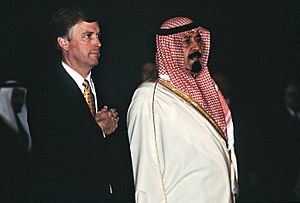
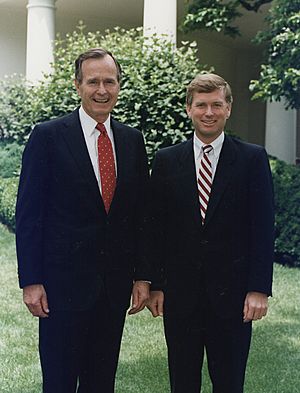
Quayle has described the Vice Presidency as a unique role. He noted that the Vice President is president of the Senate. This means they are officially part of the legislative branch. He explained that the Vice President's job is to support the President's plans.
1992 Presidential Campaign
In the 1992 election, Bush and Quayle sought reelection. They faced challenges from Bill Clinton and Al Gore. Ross Perot also ran as an independent candidate.
Some Republican strategists thought Quayle might hurt the ticket. However, he remained the Vice Presidential nominee.
Quayle participated in a vice presidential debate on October 13, 1992. He debated against Al Gore and James Stockdale. He tried to be more aggressive in this debate. He criticized Gore's book. The election was ultimately won by Bill Clinton and Al Gore.
After the Vice Presidency (1993–present)
After leaving office, Quayle became a trustee of the Hudson Institute. He also served on the board of Central Newspapers, Inc. He led a political action committee called Campaign America.
Quayle wrote a memoir in 1994 called Standing Firm. It became a bestseller. He later wrote two more books. He moved to Arizona in 1996. He considered running for president in 1996 but decided not to.
2000 Presidential Campaign
In 1999, Quayle announced he would run for president in 2000. He officially launched his campaign in April 1999. He published his book Worth Fighting For that same year.
During his campaign, Quayle criticized fellow candidate George W. Bush. He withdrew from the race in September 1999. He then supported George W. Bush for the nomination.
Later Activities
Quayle was considered as a candidate for governor of Arizona in 2002. However, he chose not to run.
In 2011, he wrote a letter to President Barack Obama. He urged the President to reduce Jonathan Pollard's sentence.
Quayle endorsed Mitt Romney for president in 2012. In the 2016 election, he first supported Jeb Bush. After Bush's campaign ended, Quayle endorsed Donald Trump. He visited Trump at Trump Tower before Trump's inauguration.
The Dan Quayle Center and Museum is in Huntington, Indiana. It shares information about Quayle and all U.S. vice presidents.
Quayle is an Honorary Trustee Emeritus of the Hudson Institute. He is also president of Quayle and Associates. He has served on the boards of several companies.
According to the book Peril, Quayle advised Vice President Mike Pence. He told Pence to follow the rules for certifying the 2020 United States presidential election. Quayle attended President Joe Biden's inauguration in 2021.
Cerberus Capital Management
In 1999, Quayle joined Cerberus Capital Management. This is a large private-equity firm. He serves as the chair of the company's Global Investments division.
Personal Life
Dan Quayle lives with his wife, Marilyn Quayle, in Paradise Valley, Arizona. They married in November 1972. They have three children: Tucker, Benjamin, and Corinne. Their son, Benjamin Quayle, also served in the U.S. House of Representatives.
Images for kids
-
Quayle with Defense Secretary Donald Rumsfeld in 2001
-
Dan Quayle and Marilyn Quayle at the 2017 Presidential Inauguration
-
Dan Quayle and Marilyn Quayle with Vice President Mike Pence in 2019
-
Quayle (right) with George W. Bush (left) at the 2021 Presidential Inauguration
See also
 In Spanish: Dan Quayle para niños
In Spanish: Dan Quayle para niños
 | Roy Wilkins |
 | John Lewis |
 | Linda Carol Brown |


